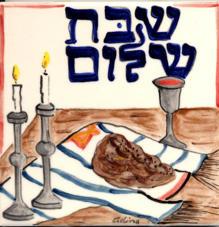Jewish Customs of Shabbat
|
Observant Jews translate this command into practical observance by refraining from any act of creation or destruction on the Sabbath. Shabbat is a day devoted to rest, reflection, prayer and Torah study. The order of the activities vary, especially among non-Orthodox communities-just as Thanksgiving varies in American homes. Friday AfternoonIn traditional Jewish homes, Sabbath preparations begin well before sunset on Friday evening. Cooking and cleaning are typical Friday afternoon affairs. It is much like preparing for the arrival of a special guest: the house is cleaned, the family bathes and dresses up, the best dishes and tableware are set, a festive meal is prepared. Strict Jews remove the light bulb from the refrigerator (so it does not turn on when you open it), set timers for appliances to come on, etc. There are even elevators in Israel that will automatically open on Sabbath so a Jew does not have to push a button. Friday Night Shabbat DinnerSabbath begins at sunset. Shabbat candles are lit and a blessing is recited no later than eighteen minutes before sunset1. This ritual, performed by the woman of the house, officially marks the beginning of the Sabbath. The most picturesque tradition associated with the Sabbath is the candle lighting. The candle lighting marks the beginning and end of all Sabbaths, weekly or annual celebrations. The tradition of lighting candles to begin and end the Sabbath started in a very practical way. Scripture says, "You shall not kindle a fire in any of your dwellings on the Sabbath day" (Exodus 35:3). In ancient times, the only form of light available at night was an oil lamp or candle. In order to have the supply of oil burn longer into the Sabbath, the lamps were lit at the very last moment before the Sabbath began - at or before the beginning of sundown. Once they burned out, they could not be relit until after the Sabbath was over. That time is marked by the lighting of the Havdalah candle (described below) (Taylor 1996). Some families attend a brief evening service. In many synagogues, the Friday evening prayers are recited at dusk. After services, the family comes home for a festive, leisurely dinner. Before dinner, the man of the house recites a prayer over wine (Kiddush) sanctifying the sabbath. There are no specific requirements or customs regarding what to eat except for the challah bread, a sweet, eggy bread shaped in a braid. Covers made of linen or other fine fabric are used for covering the Sabbath loaves (challah covers). They are often embroidered with words such as "In honor of the Sabbath" or another relevant phrase, decorative floral patterns, or Sabbath themes. BlessingsA beautiful Shabbat tradition is the parental blessing. The father places both hands on each child as he says a blessing over them. Examples: A traditional Jewish blessing for a son is: May God make you like Ephraim and Manasseh. A traditional Jewish blessing for a daughter is: May God make you like Sarah, Rebekah, Rachel and Leah. Or a personal blessing is said for each child using a format similar to this: Some families say a husband and wife blessing. Husbands read Proverbs 31:10-31 to their wives and wives read Psalm 112 to their husbands. Then everyone joins hands and sings or recites a phrase similar to the following: May Adonai bless you and guard you. May Adonai shine Divine light upon you and be good to you. May Adonai face you and give you peace." SaturdayMany Jews spend Saturday morning in the synagogue. Upon returning home, traditional Jews repeat several of the Friday evening customs as they enjoy their Sabbath lunch. Cooking is prohibited on Shabbat so lunch is usually prepared the day before (in crock pot or slow cooker). Saturday afternoon is unstructured, designed for relaxation and visiting. Activities include: telling uplifting stories at meals, studying the weekly Torah portion (individually, as a family or with friends, or in a special class or study) reading other suitable study materials, taking a nap, playing games with the children, a walk in the park, worship services, telling stories, singing songs, visiting relatives and friends, and if possible, visiting the sick, the shut-in, and the elderly. In the evening, when three stars are seen, the Havdalah service is performed. Saturday Evening Havdalah ServiceThe Havdalah ceremony is held on the Sabbath evening just after dark. This is a man-made short ceremony to formally mark the end of Shabbat. The Hebrew word havdalah means separation or distinction. The following items are used to perform the ceremony: a cup of wine, a braided candle, and a box of sweet-smelling spices. Participants stand close together in a circle. Blessings are said over each item as they are passed around the circle. The wine is poured until it overflows and then the cup is lifted up again. Psalm 116:13 is recited: I will take the cup of Salvation and call upon the name of the Lord. Then the braided candle is lit. It is customary for the child to hold the candle. A blessing is said over the wine. The spices are shaken and passed around for all to enjoy the aroma. A blessing is said over the spices. The wine is passed around for everyone to sip. The candle is extinguished in the remaining wine as the final blessing is said. The ceremony is concluded with a song.
Copyright © Heartofwisdom.com.
All rights reserved. Used by Permission |
